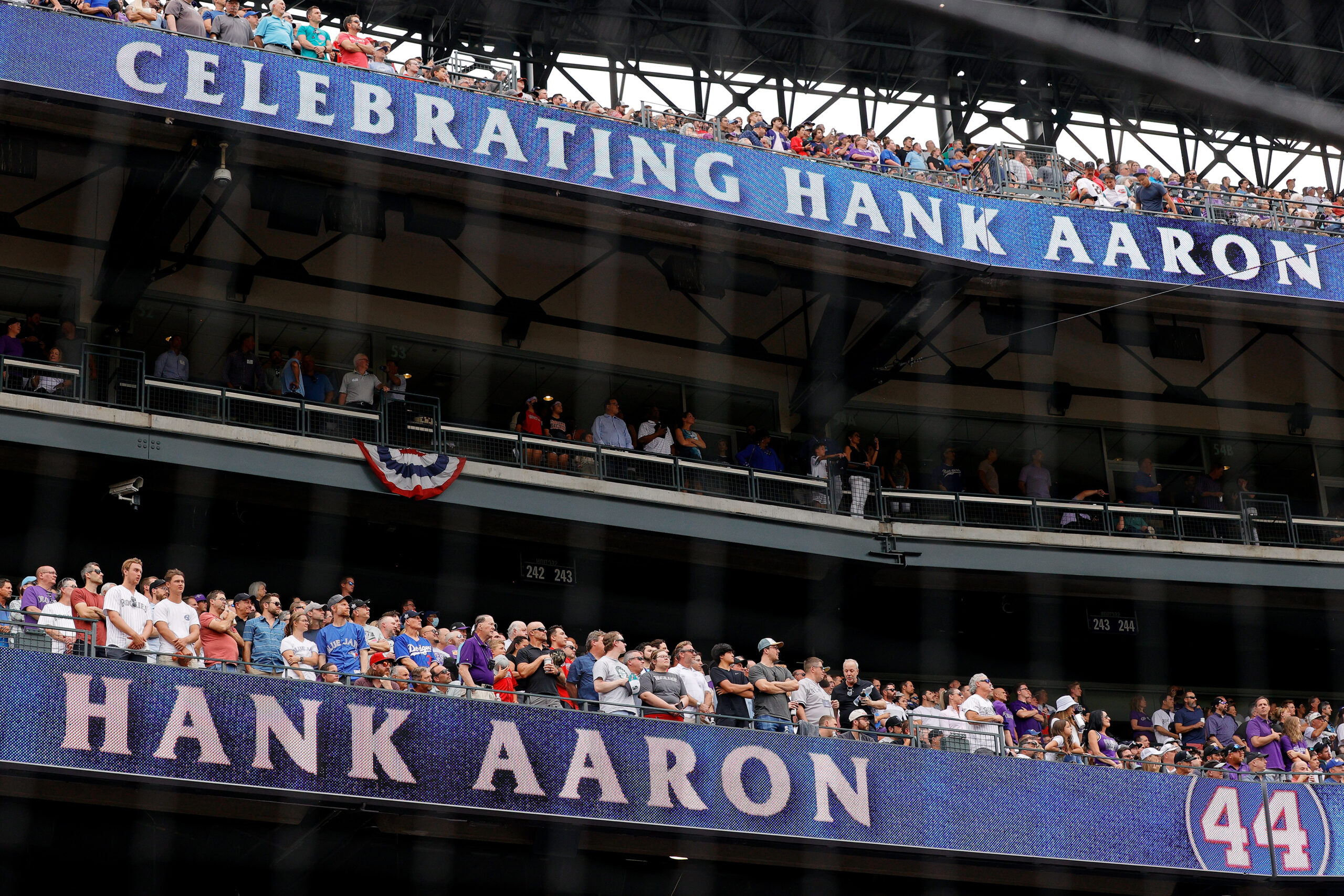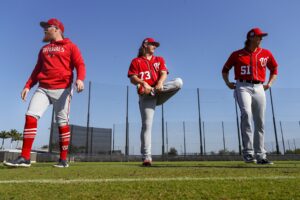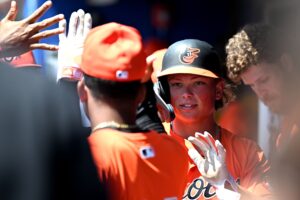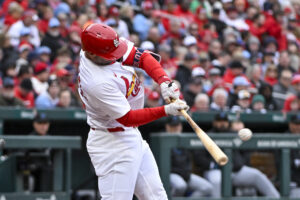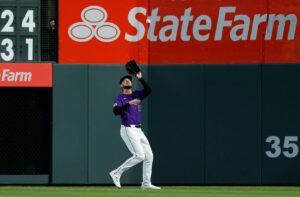April 8, 1974. Atlanta Braves icon Henry Aaron hit career home run number 715, surpassing the MLB home run record by New York Yankees legend Babe Ruth. It was a record thought unbreakable, but Hank Aaron found a way. Baseball’s numbers are important. Mention 714 home runs, a 56-game hitting streak, or seven no-hitters, and even the most casual fan will know what you’re talking about. But do you know the best career quarterback rating? Me neither.
The Babe
Ruth held two home run records: 60 homers in a season in 1927 and, of course, 714 career home runs. Ruth felt that it was possible that somebody would come along and break his single-season record. After all, he noted, Jimmie Foxx of the Philadelphia Athletics came close when he hit 58 in 1932. But the Babe thought his career record was untouchable.
Ruth passed away in 1948, but his widow was still alive in 1974 and couldn’t avoid the media. In the male-dominated world of 1974, the papers referred to her as “Mrs. Babe Ruth” as though she had no identity of her own. She had a first name: Claire, and she had been an actress and model.
Claire told the Associated Press, “The Babe loved baseball so very much. I know he was pulling for Hank Aaron to break his record.” Millions saw the new home run king crowned on TV in addition to the 53,775 at Atlanta-Fulton County Stadium. Claire didn’t watch. She knew the papers would be on the phone once Aaron hit home run number 715.
Hammerin’ Hank Aaron
Hank Aaron had been a cross-handed-hitting shortstop with the Indianapolis Clowns of the Negro League before debuting with the Milwaukee Braves as an outfielder at age 20 in 1954. He remained with the Braves when they moved to Atlanta in 1966. He led the National League in home runs four times. However, at an even six feet, 180 pounds, he never had the look of a classic slugger, nor did he approach his at-bats like one. Hank Aaron was a line-drive hitter to all fields. His wrists were strong enough that many of those line drives carried over the fence. But make no mistake, he was a good all-around hitter. He had two of the best seasons in Braves history in 1961 and 1963.
He would become a pull hitter later in his career when he no longer had the speed of his youth. As his career progressed and he accumulated more home runs, he declared his intention to break the all-time record. Of course, the media gave special attention to his career homers 500, 600, and 700. However, Aaron’s biggest home run wasn’t number 715. His biggest was hit on September 23, 1957, off the St. Louis Cardinals’ Billy Muffett in the bottom of the 11th inning to win the game, 4-2. That blast clinched the National League pennant for Milwaukee.
The Controversies
Unfortunately, as he approached the record, Aaron received death threats and scores of racist hate mail. Some white “fans” didn’t like the idea of a Black man breaking the cherished record of a white man. Apart from the race issue, Aaron had his detractors. Some pointed to Aaron’s 11,288 AB at the end of 1973, as opposed to 8,399 for Ruth’s career. Others pointed to the home-fun friendly Atlanta-Fulton County Stadium, known as The Launching Pad. At the time, it had the highest elevation in baseball. Combined with the hot temperatures in Atlanta, the ball carried further. Indeed, as an Atlanta Brave, Aaron hit 190 homers at home as opposed to 145 on the road. From 1970-74, Aaron hit 108 of 179 home runs, or 60.34 percent, at home.
While these might be valid points, the record was most career home runs, period. Not most home runs in a certain number of at-bats. Not most home runs in unfavorable ballparks. None of these critics seemed to mind that Yankee Stadium’s right field, at 314 feet, favored left-handed batters like Ruth. Furthermore, when Ruth hit his 714th home run in 1935, he was old and sick and in decline. Ruth hit just .181 in 1935. Had he hung on for another 3,000 more AB, he wouldn’t have passed Aaron’s eventual 755 career total.
In 1961, when Roger Maris broke the single-season record with his 61st homer, then-Commissioner Ford Frick declared that it would bear an asterisk in the record books. Maris had hit his 61 homers in a 162-game season, whereas Ruth hit his 60 homers in a 154-game season. Oh, and Frick had been the Babe’s ghostwriter in 1934. Fortunately, in 1974, nobody had an appetite for any more stupid asterisks in the record books.
The Chase
Aaron finished the 1973 season with 713 home runs. Aaron had to resume the chase for the MLB home run record of 715 in 1974. The Braves opened in Cincinnati against the Reds on Friday, April 4. In his first plate appearance, Aaron hit number 714 off right-hander Jack Billingham with two men on base. With the Braves ahead 6-2 in the seventh inning, Aaron was replaced defensively. Braves manager Eddie Mathews, Aaron’s former teammate, announced that Aaron would sit out the two remaining weekend games in the series so he could break the record in front of the home fans in Atlanta on Monday.
Enter Commissioner Bowie Kuhn. After Hank Aaron sat out Saturday’s game, Kuhn ordered that Aaron be in the lineup on Sunday lest Mathews and the Braves face “serious consequences.” Kuhn reasoned that teams had to give their best efforts to win every game. Aaron played on Sunday and was 0-for-3 in a 5-3 Braves victory. His detractors accused him of not trying hard in the Sunday game. Of course, that notion was ridiculous.
The Commissioner
Kuhn was a buffoonish, meddlesome character disliked by fans and owners alike. After telling Mathews how to run his team, Kuhn elected to stay away from Atlanta on April 8. Instead, Kuhn was in Cleveland, speaking to the Wahoo Booster Club, who would have understood if Kuhn canceled to be in Atlanta and probably didn’t like him either. Kuhn reasoned that he’d promised to be in Cleveland and that it made more sense since he had been not far away in Cincinnati. Despite being in Ohio, the birthplace of aviation, Kuhn never considered that he could easily hop a flight to Georgia. In 1980, Aaron failed to appear in New York and accept an award from Kuhn, naming Hank Aaron’s MLB Home Run Record of 715 as the moment of the decade. They met and made up in 1981.
The MLB Home Run Record for Hank Aaron
The game of April 8, 1974 was televised across the nation on NBC’s Monday Night Baseball. It was a time before 24-hour sports channels. If the game didn’t just happen to take place on a Monday, the nation wouldn’t have seen it live. In an attempt to boost ratings, Monday Night Baseball featured celebrities in the booth alongside Curt Gowdy and Tony Kubek. There were no such gimmicks on this evening. The Braves’ opposition was the Los Angeles Dodgers. Their pitcher was veteran left-hander Al Downing. Aaron walked in the second inning.
In the bottom of the fourth, Darrell Evans led off by reaching on an error. Hank Aaron stepped to the plate next, having not swung at a pitch yet. Finally, he attacked a 1-0 fastball and sent it deep over the left field fence, into the Braves bullpen where it was caught by reliever Tom House. “(Downing) just hung it a little,” Aaron told the AP. “It was inside, but I think he wanted it further inside.” As Aaron rounded the bases, he was joined by two 17-year-old males who ran with him. Despite receiving death threats during the chase, Aaron adjudged them harmless and didn’t mind their presence.
House sprinted toward home, where a welcoming committee was there to greet Aaron. There were Aaron’s teammates, including Dusty Baker, the on-deck hitter. Baker was the San Francisco Giants manager when his player, Barry Bonds, hit his 756th homer to beat Aaron’s record. Also present were Hall-of-Famer Monte Irvin (taking Kuhn’s place), Georgia governor Jimmy Carter, and, because this was the good old celebrity-obsessed USA, Sammy Davis, Jr. and Pearl Bailey. In the sixth inning, Aaron took a call from President Richard Nixon, who was four months away from making history himself, and not in a good way.
The Pitcher
Downing was oblivious to his place in history. “I think people will remember the pitcher who throws the last one he ever hits, not the 715th,” he told Sports Illustrated. That would be Dick Drago in 1976 when Aaron was back in Milwaukee with the Brewers. Downing was dead wrong about who would be remembered. For his career, Hank Aaron hit .296/.355/.667, 3 HR, and 10 RBI against Downing.
The Fans
Britt Gaston and Cliff Courtenay were the two fans who jumped on the field as soon as Hank Aaron connected with home run 715, patting him on the shoulder as they ran the bases with him. Once they rounded second, they made their way for the stands, only to be surrounded by police. Gaston’s father bailed them out of jail. The charges were dropped the next morning. Gaston became an optometrist before dying from cancer, while Courtenay went on to work in real estate.
Charlie Russo, then 41, scored seats behind the third base dugout and brought a movie camera. He took a home movie of Aaron’s record-breaking shot. Then he noticed below that somebody had opened a gate to let Aaron’s family onto the field. Russo ran through the gate and got some close-up footage of Hank Aaron and others. He also managed to reach down and get Aaron’s resin bag and donut. Aaron was cool about it, signing the items for Russo.
The Last Word on Hank Aaron’s Home Run
As noted, and as any self-respecting baseball fan knows, Bonds would eventually break Hank Aaron’s MLB home run record. Maybe today, great moments are too easily available to us, and they lose their mystique. Maybe we get exhausted from the constant hype from competing sports outlets. Whatever the reason, somehow, it just didn’t feel the same as when Aaron hit home run number 715.


